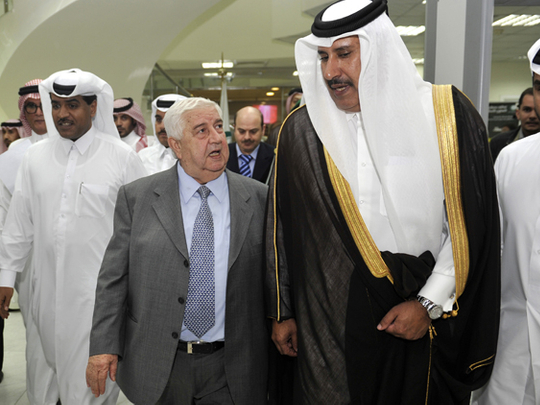
Many writers and analysts are focusing on the rising regional role of Qatar, given that it was considered the main driving force behind the "tough" Arab League stance on Syria. Some are even suggesting that Qatar is assuming the role of the main regional pro-western power assigned for Saudi Arabia.
That is only partly true: Qatar's regional role is on the rise, but it has not yet taken over Saudi Arabia's role in the Gulf or the wider Middle East. Though the changes in the region are sweeping and Qatar is keeping pace with them, many factors limit the prospects of Qatar becoming the regional "superpower".
No doubt Qatari action over Libya was remarkable, as it led the effort to isolate the regime and procured Nato military intervention that eventually led to Muammar Gaddafi's shameful end.
Libya marked the bold involvement of Doha in regional issues, committing troops, fighter jets and providing material support to anti-Gaddafi forces.
Though the UAE was the only other Arab country to take part in the Libya mission, Qatar got deeply involved in Libyan affairs. It's true that its ‘soft power' tool, Al Jazeera satellite channel, played a crucial role in the Arab Spring since the start of the popular protest in Tunisia a year ago.
Ousted Egyptian president Hosni Mubarak and his regime considered Al Jazeera an important factor in the popular revolt against him.
When it comes to Syria, Qatar is not alone in pushing for a firm stand against regime brutality and suppression of popular protests. But because of the Libyan case and the controversy about Al Jazeera's role in popular uprisings — becoming an active player rather than being an objective media outlet — many believe that everything is cooked up in Doha. Nobody paused to think that if any Arab country would have wanted to see Gaddafi gone, it would have been Saudi Arabia.
Infamous spat
Millions watched the infamous spat between the colonel and King Abdullah Bin Abdul Aziz of Saudi Arabia at an Arab summit on Al Jazeera. Add to that the failed assassination attempt on the king, which was blamed on Gaddafi.
As for Syria, Saudi problems with Bashar Al Assad's regime go back for years and Lebanon has been an arena of Saudi-Syrian conflict.
It might seem that Qatar is more proactive, using its media power and financial muscle to advance political goals — but its goals are the same as those of Saudi Arabia.
Actually one might argue that what Qatar does is just want the Saudis want but refrain from doing it openly for their own reasons. I don't think it's either of those arguments and, simply put, Qatar is working in accordance with an apparent consensus in the Arab ‘moderate' camp.
Gaddafi used to denounce the League's resolutions on Arab issues as just being translations of orders sent in English from Washington. All that was long before Qatar's interventions gained prominence.
Why did Qatar not get involved in Yemen, as it did in Libya and Syria? Because Saudi Arabia will not allow meddling in its backyard.
The reconciliation between Riyadh and Doha in recent years was mainly based on Qatar accepting the leading position of Saudi Arabia within the Gulf Cooperation Council (GCC) and the region.
I think the talk about Qatar replacing Saudi Arabia as the main regional power is wishful thinking of the defunct neoconservative camp in the west.
It is a naïve ploy to maintain influence by changing proxies as if the region is just the same as a decade or more ago.
The Financial Times wrote recently in an editorial how Qatar could be a better friend of the west than Saudi Arabia. The newspaper considered Doha's links with Islamists and its good relations with Iran as assets that shouldn't cause concern to the West.
Influence
Again, if there is an Arab country that has influence over Islamists all over the region, it is Saudi Arabia, not only because of its financial muscle but also because it is home to Islam's two holiest sites in Makkah and Madinah.
The Qatari Prime Minister Shaikh Hamad Bin Jasem Al Thani used to say that his country is a small state and deals with the world around it on that basis. Some might see that as being cynical in light of the Qatari outreach now, but actually it is true.
Being small and rich requires you to be proactive in order to protect your interests; otherwise you'll be run over.
There is no ambiguity in Doha manoeuvring within the wider strategy of the big patrons, whether the US or Saudi Arabia.
Dr Ayman Mustafa is a London-based Arab writer.










